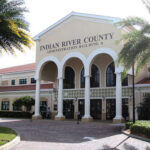INDIAN RIVER COUNTY – More than 200 residents from numerous south county neighborhoods gathered in the clubhouse of Citrus Springs to discuss the impact of a proposed new recycling and debris center on Oslo Road.
The facility, if ultimately approved by the Board of County Commissioners later this month, would be a little more than a half-mile from the clubhouse, a cause for concern from many of the residents in attendance. “Please be courteous, respectful,” urged Citrus Springs representative Nick Liguori. Despite numerous reminders during the course of the 90-minute meeting, many residents cheered, applauded or booed – depending on the comments made.
County staff members met with representatives and residents of several communities, which combined have more than 1,100 households.
Community Development Direct Bob Keating and Planning Director Stan Boling fielded the bulk of the questions from residents.
“We’re staff,” Keating told the audience. “We don’t vote.”
He asked the audience to keep that point in mind when posing their questions and concerns about the proposed facility.
The Board of County Commissioners will hold a public hearing at 9 a.m. March 22 during the regular board meeting to decide the issue. The county’s Planning and Zoning Commission has already voted to recommend approval to the commission.
Before residents had a chance to ask questions, Keating and Boling explained the project and the process it has been through, including public notice for both the Planning and Zoning and County Commission meetings.
When Boling mentioned that a notice sign had been posted on the property, the audience erupted in boos and laughs and exclamations that the sign is so small that most drivers wouldn’t notice it.
“Lord have mercy,” one woman quietly said to another beside her.
“This is called ‘covering your butt’,” another woman said.
Peggy Hoffman, president of the Villas Citrus Springs home owner’s association, asked the county staff how a recycling and debris collection center could be considered an agricultural use, given it would be located on agriculturally-zoned property.
The 9-acre site on Oslo Road between 58th and 66th avenues would be allowed to take in vegetative waste as well as debris from construction and demolition projects for recycling. Wood materials would be mulched and concrete materials be crushed.
The site is currently operated by an irrigation company that does a bit of work irrigating agricultural land, Boling explained, and mulching plant materials could also be considered an agricultural use.
“That’s garbage!” shouted one woman. Other members of the audience scoffed at the suggestion.
Boling also explained that non-agricultural uses can be allowed on agriculturally-zoned land due to the availability of land for large businesses.
Another resident asked how it was determined that such a facility could possibly be “compatible” with the surrounding properties. The speaker pointed out the number of residential developments both constructed and planned.
“It’s a difficult concept,” Boling said. “It really is.”
He explained that there isn’t exactly a definition but, instead, a test that helps reach that determination based on distance, drainage, traffic and other considerations.
Before the end of the meeting, which had still more residents seeking answers to their questions, organizer Liguori told the audience that they need to appear in full force at the Board of County Commissioners meeting March 22.
“We need three ‘no’ votes,” he said.






